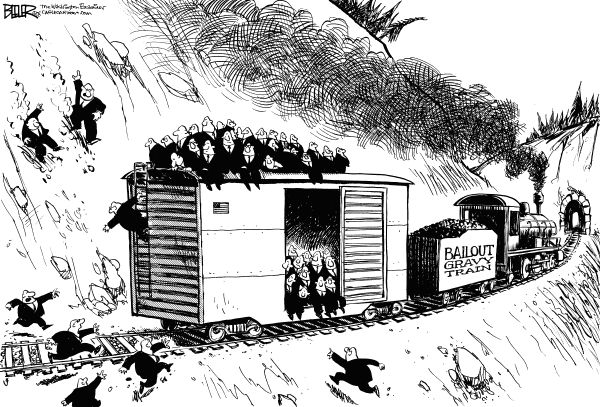BlackRock looks to buy more U.S. mortgage agency debt
12:30am EDT
By Kevin Plumberg
SINGAPORE (Reuters) - BlackRock, the world's largest money manager, is looking for opportunities to buy U.S. mortgage agency debt in the wake of Standard & Poor's downgrade of the U.S. sovereign rating, said Rick Rieder, the firm's chief investment officer of fixed income, fundamental portfolios.
Financial markets in Asia slumped on Monday after S&P's unprecedented decision to cut the U.S. debt rating on Friday to AA-plus from AAA, a move that could lead to knock-on credit rating cuts of mortgage finance companies Fannie Mae (FNMA.OB: Quote, Profile, Research, Stock Buzz) and Freddie Mac (FMCC.OB: Quote, Profile, Research, Stock Buzz).
Rieder, who oversees some $612.5 billion in assets as of June for BlackRock, is focused on the relative quality of so-called GSE (Government Sponsored Enterprise, a sweet spot of private gain and socialized loss, generally kept ambiguous until needed) debt among other credits.
"GSEs are still a high-quality instrument, and as part of upgrading the liquidity of our portfolio, we have been a buyer of agency mortgages," Rieder told Reuters over the telephone.
"With increased volatility the agency mortgage market can experience some weakness, and if there is weakness we would add to the portfolio again," he added.
For Fannie Mae and Freddie Mac, losing their AAA-rating could lift borrowing costs, potentially making mortgages more expensive for consumers and adding to stress in the already unstable U.S. housing market.
For the past few months since the Federal Reserve's $600 billion bond-purchase programme wound down, BlackRock has been protecting its credit portfolios against risks coming from the euro zone debt crisis and the impasse over the U.S. debt ceiling by increasing exposure to high-grade bonds.
Rieder said the S&P action was well-flagged so will require little if any changes to his portfolios.
He did not expect the role of U.S. Treasuries has collateral in the repo market to change after the S&P downgrade.
"The Treasury market is a $13 trillion market and a lot of the reason it is used as a form of collateral is not just the AAA rating or what was a AAA rating but the incredible liquidity and because it has become such an accepted form of payment and collateral. A one-notch downgrade by one of three agencies won't change that dynamic in any significant form."
Regarding the economic outlook, Rieder believes the U.S. economy will grow below trend for a long time, and the Federal Reserve will not necessarily add more liquidity through a new quantitative easing programme. Rather it may keep the size of its balance sheet for a longer period and extend the duration of some its fixed income assets, he said.
"A recession is unlikely but we can't rule it out."
http://www.reuters.com/article/2011/...7770DM20110808
12:30am EDT
By Kevin Plumberg
SINGAPORE (Reuters) - BlackRock, the world's largest money manager, is looking for opportunities to buy U.S. mortgage agency debt in the wake of Standard & Poor's downgrade of the U.S. sovereign rating, said Rick Rieder, the firm's chief investment officer of fixed income, fundamental portfolios.
Financial markets in Asia slumped on Monday after S&P's unprecedented decision to cut the U.S. debt rating on Friday to AA-plus from AAA, a move that could lead to knock-on credit rating cuts of mortgage finance companies Fannie Mae (FNMA.OB: Quote, Profile, Research, Stock Buzz) and Freddie Mac (FMCC.OB: Quote, Profile, Research, Stock Buzz).
Rieder, who oversees some $612.5 billion in assets as of June for BlackRock, is focused on the relative quality of so-called GSE (Government Sponsored Enterprise, a sweet spot of private gain and socialized loss, generally kept ambiguous until needed) debt among other credits.
"GSEs are still a high-quality instrument, and as part of upgrading the liquidity of our portfolio, we have been a buyer of agency mortgages," Rieder told Reuters over the telephone.
"With increased volatility the agency mortgage market can experience some weakness, and if there is weakness we would add to the portfolio again," he added.
For Fannie Mae and Freddie Mac, losing their AAA-rating could lift borrowing costs, potentially making mortgages more expensive for consumers and adding to stress in the already unstable U.S. housing market.
For the past few months since the Federal Reserve's $600 billion bond-purchase programme wound down, BlackRock has been protecting its credit portfolios against risks coming from the euro zone debt crisis and the impasse over the U.S. debt ceiling by increasing exposure to high-grade bonds.
Rieder said the S&P action was well-flagged so will require little if any changes to his portfolios.
He did not expect the role of U.S. Treasuries has collateral in the repo market to change after the S&P downgrade.
"The Treasury market is a $13 trillion market and a lot of the reason it is used as a form of collateral is not just the AAA rating or what was a AAA rating but the incredible liquidity and because it has become such an accepted form of payment and collateral. A one-notch downgrade by one of three agencies won't change that dynamic in any significant form."
Regarding the economic outlook, Rieder believes the U.S. economy will grow below trend for a long time, and the Federal Reserve will not necessarily add more liquidity through a new quantitative easing programme. Rather it may keep the size of its balance sheet for a longer period and extend the duration of some its fixed income assets, he said.
"A recession is unlikely but we can't rule it out."
http://www.reuters.com/article/2011/...7770DM20110808

Comment